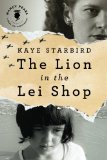Summary | Excerpt | Reviews | Beyond the Book | Readalikes | Genres & Themes | Author Bio

As for the lion, I know now he was a figment of Willard's imagination, his personal contribution to the terrible inner and outer devastation of that dark December. But I didn't know it then. When I think back to those days, I can still see the small locked shop with the tangled swirls of wire around it and the cruel and menacing face of the lion I never saw. He was a green lion.
Once, several years later, when we were living on the mainland—waiting for the war to end, waiting for the waiting to end, waiting waiting waiting for my father to come home—Aunt Liz paid us a visit, traveling from her apartment in New York to our new-old farmhouse in New Hampshire, as she occasionally did, to share and assess and try to forget her hopes and doubts with Mother. I still believed in the lion then, and I decided to ask Mother and Aunt Liz about him, sort of casually, even though Willard Seymour—who never left any loose ends when he was weaving a web of terror—had sworn me to secrecy. (The fact was, said Willard, the lion liked best of all to eat little girls who were tattletales.)
Mother and Aunt Liz listened to me in the mannerly, non-listening fashion that grownups frequently use with small children, and I could tell they didn't have any idea what I was talking about, so I stopped talking, which was just as well. That's when I first learned that memory, right or wrong, is a subjective thing. The lion hadn't been part of their private war, any more than had the bald-headed sailor with the black teeth, or the square-toed shoes that hurt my feet, or the cigarette burn in my yellow pinafore. My mother saw the sailor because he sat at our table for a while, and she bought the shoes, and I showed her the cigarette burn. But those weren't the things she remembered.
The steps were something else again.
When I mentioned the steps that led downward and outward from the ship to my father, the steps that always moved away in the dream I kept having, my mother looked puzzled a minute. Then she said: "Oh, you mean the gangplank. Those weren't steps," and she quickly switched the conversation to familiar inconsequentials. I didn't say anything more about the steps, because I knew what she and Aunt Liz were about to do, and they did. They began talking the way they always talk when they get together, in that different tone of voice they started using the night of the air raid; and pretty soon they were discussing how to be beautifully pregnant during a bombing and what the well-dressed woman wears to a war and the seagull that wanted to see San Francisco, and the pleats coming back into my mother's red plaid skirt. Also the Filipino steward they called Art with the big heart and Mrs. Daly's Daly Dozen and the rest of it. In other words, the sea trip back from Hawaii. Not the terrible time before or the terrible time afterward. The sea trip was a terrible time, too, but Mother and Aunt Liz preferred not to remember that it was. Over the years they have settled on that particular period in the past as an interim oasis. Not a safe oasis. Not a happy oasis. Just an oasis where, in retrospect, they can rest long enough to forget how they got there and where they would be going when they left. I guess a lot of people have these oases.
There is always a beginning to a story, though seldom a recognizable beginning to anything else, so I'll try to start at the beginning.
It was December seventh, nineteen forty-one. No, that's history, not the beginning of a story. In the story, it was a rainy Sunday, and when I woke, the mynah birds were quarreling in the avocado trees on the lawn, and the rain was splashing and dripping from the great red poinsettia blooms outside my window. Not the back window that faced the lei shop; the side one that faced Willard Seymour's house. I listened to find out whether or not anyone else was awake and stirring, but the rooms were quiet. I lay in bed and looked across at Willard's rain-dark rooftop, where a flock of little gray doves was huddled together, mourning to one another. The day was grayer than the doves, but I wasn't worried about the weather. My parents and I were going to the beach later, and I knew the day would be golden and warm at Waianae on the other side of the island, at the picnic place, the Sunday place where we always went on winter weekends. We usually packed a lunch after church was over, left home a little before noon, and stayed at Waianae until suppertime. I looked forward to Sunday all week, every week.
Excerpted from The Lion in the Lei Shop by Kaye Starbird. Copyright © 2013 by Kaye Starbird. Excerpted by permission of Amazon Publishing. All rights reserved. No part of this excerpt may be reproduced or reprinted without permission in writing from the publisher.
Your guide toexceptional books
BookBrowse seeks out and recommends the best in contemporary fiction and nonfiction—books that not only engage and entertain but also deepen our understanding of ourselves and the world around us.